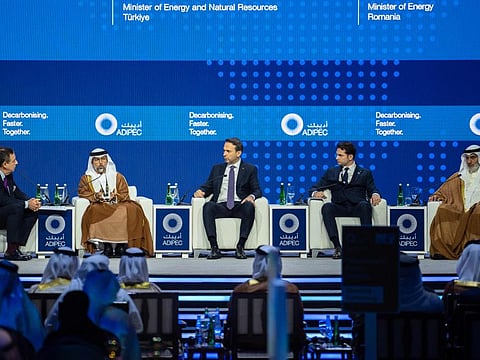ADIPEC 2023: Undersupply in oil market a bigger worry, says Al Mazrouei
Minister highlights lopsided distribution of investments within OPEC+ countries

Abu Dhabi: OPEC is doing its best to maintain a healthy balance between supply and demand, Suhail Mohamed Al Mazrouei, UAE’s Minister of Energy and Infrastructure, said on Monday.
Talking about the global economy’s resilience in the face of rising oil prices and increasing interest rates, the minister pointed out the necessity of maintaining a balanced market that appeals to investors. While this year has seen an uptick in energy investments, he cautioned against pushing production to its limits, risking a potential shortage of spare capacity. Such a scenario could trigger price volatility and supply disruptions.
“My worry is not an oversupply market in the short term,” said Al Mazrouei. “My worry is an undersupply market in the longer term. We lost 4 million barrels within three years (because of underinvestment in the oil sector), and that’s a significant concern.”
In September, OPEC’s chief warned of “dire consequences” for the global economy if the world abandoned fossil fuels. Calls to cut out hydrocarbons “set the global energy system up to fail spectacularly”, OPEC Secretary General Haitham Al Ghais said.
“It would lead to energy chaos on a potentially unprecedented scale, with dire consequences for economies and billions of people worldwide,” he said.
Global energy heads have been urging governments to invest more in oil and gas projects amid an energy crisis exacerbated by the Ukraine war. According to the International Energy Forum, oil and gas upstream capital expenditure rose by 39 per cent to $499 billion last year, the highest level since 2014.
However, the IEF has said that annual upstream spending needs to increase to $640 billion by 2030 to ensure adequate supplies.
A key concern Al Mazrouei raised is the lopsided distribution of investments within OPEC+ countries. Although they collectively control 80 per cent of the world’s oil resources, they produce only 40 per cent. This glaring investment imbalance poses a grave risk to future energy supplies.
China’s economic growth
Talking about China’s role in global energy demand, Al Mazrouei underscored the country’s pivotal position in the energy landscape. He said that Chinese energy demand is critical in shaping the group’s decisions.
“China is a big part of our analysis every two months to monitor the improvements or decline in any major markets,” he said. “We are all looking at and meeting to analyse and then decide based on that analysis. So it’s not just a decision that is disconnected from reality.”
His comments come in response to the World Bank’s recent report that it is now expecting China’s GDP to grow less than expected, so they’re forecasting lower economic momentum.
“We believe we (OPEC) have more data within OPEC and OPEC+ than analysts, regardless of who they are. We believe we have because we are selling to China and different parts of the world.”
He said that last year’s claim that China’s growth is slowing down ended up with the highest increase in demand that we have ever seen in history, which is around 2 per cent.
The country, the world’s largest crude importer and second-largest economy, recently announced a string of stimulus measures, including halving the stamp duty on stock transactions and easing mortgage rates.
Nuclear energy
The UAE minister also discussed the role of nuclear energy in the broader energy mix. “End of the day, it’s the affordability. Can the consumers afford a price of electricity or a price of energy that is five times more expensive? And assume that the whole world will be able to take that’s very wishful thinking,” he said, speaking at a fireside chat at ADIPEC ‘23.
He said the global economies should be working on several aspects, from decarbonising the process by capturing CO2 emissions to building reliable nuclear plants and maximising renewable energy investments.
Sign up for the Daily Briefing
Get the latest news and updates straight to your inbox







